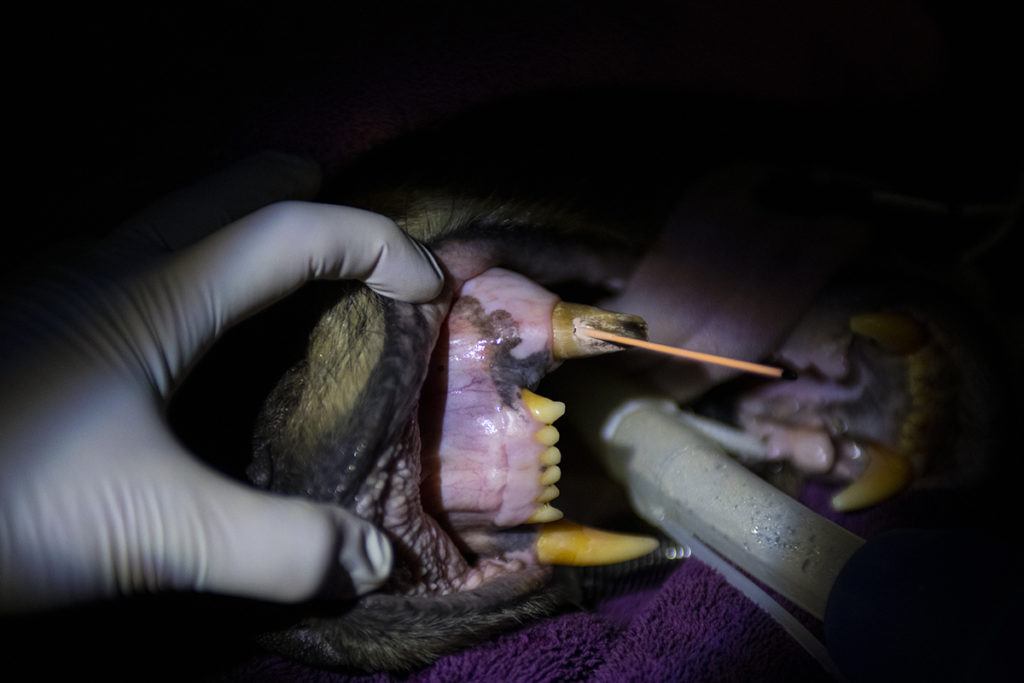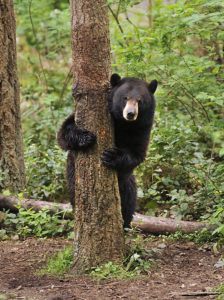Benton the black bear gets a root canal
Eatonville, Wash. – You could call them the “bear” necessities.
Healthy teeth are pretty important when you’re a 423-pound black bear that eats seven pounds of food every day.
So when Northwest Trek Wildlife Park veterinarian Dr. Allison Case saw that Benton, one of the park’s two black bears, had a fracture in an upper canine, she decided it was time for a root canal.

“During his regular physical check-up last month, I had the opportunity to closely examine his upper left canine and the root exposure,” Case said. “It’s a significant tooth, and we want to protect it long-term. The ideal approach was a root canal.”
Case called in Dr. Kevin Stepaniuk, a veterinary dentist, who has performed root canals on a number of other zoo animals, including a tiger and a polar bear at Point Defiance Zoo & Aquarium. Together with veterinary technician Sara Dunleavy, keeper Haley Withers and Stepaniuk’s own team, they assembled early on Friday for the procedure.
Under full anesthetic, Benton stretched out on his hammock bed in the den under warming blankets. First came cleaning and filing of the exposed root and pulp area to remove all decay. The team then disinfected the canal, and Stepaniuk sealed the exposed area from the environment.
While the veterinary team worked, Withers took the chance to get a close look at Benton’s fur, claws, paws and body – something you can’t easily do with an awake, active bear. She trimmed Benton’s claws and assessed his wiry black fur.

Eleven years old, Benton arrived at Northwest Trek in 2014 from the Topeka Zoo in Kansas, along with his sister Fern. The bear siblings share a large forested habitat at the wildlife park, splashing in the stream in summer and sleeping out the winter in a den they built themselves a few years ago.
They are two of four bears at Northwest Trek. Grizzly bear cubs Hawthorne and Huckleberry, who came to the wildlife park last summer after they were orphaned in the wild, live next door in their own natural habitat.
Northwest Trek guests can see them daily through summer, and meet keepers like Withers at scheduled keeper chats and at the upcoming Zookeeper Academy event July 20-21.
“Benton uses his mouth for so much more than just eating,” said Withers. “He uses it to aid his climbing, communication, and manipulating things in his environment. Maintaining his oral health is just one way that we are able to provide excellent care for Benton so that he can continue to do all the things he loves to do.”
“He’s a very healthy bear,” said Case, after the dental procedure. “His teeth are important, and I’m glad we’re able to protect them with this kind of care.”
Northwest Trek is open from 9:30 a.m. to 4 p.m. Mondays through Fridays, and 9:30 a.m. to 5 p.m. Saturdays and Sundays through June 30. Summer hours of 9:30 a.m. to 6 p.m. daily begin on July 1 and run through Sept. 3. The wildlife park will be open on both the Fourth of July and Labor Day.
###
Northwest Trek, accredited by the Association of Zoos & Aquariums, is a 725-acre zoological park dedicated to conservation, education and recreation by displaying, interpreting and researching native Northwest wildlife and their natural habitats. The wildlife park is a facility of Metro Parks Tacoma and is located 35 miles southeast of Tacoma off State Highway 161.
Media Contacts
Kris Sherman, 253-226-6718 or kris.sherman@pdza.org
Whitney DalBalcon, 253-404-3637 or whitney.dalbalcon@pdza.org